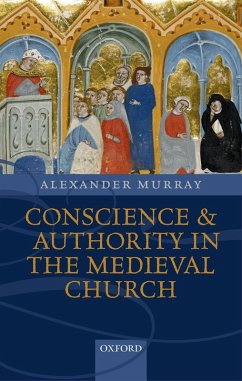Alexander Murray has long had an intellectual interest in the history of religion - struggling between his inbuilt anti-clericism and his pronounced monastic leanings. The five essays in Conscience and Authority in the Medieval Church take on this dialectic, addressing the difficult relationship between private conscience and public authority in the twelfth and thirteenth centuries. In any organization, political, military, commercial, or religious, the relationship of conscience and authority is always potentially fraught, and can create dilemmas both for those in authority and those without. This volume records how our European predecessors approached and dealt with the same dilemmas as we face in the modern world.
Dieser Download kann aus rechtlichen Gründen nur mit Rechnungsadresse in A, B, BG, CY, CZ, D, DK, EW, E, FIN, F, GR, HR, H, IRL, I, LT, L, LR, M, NL, PL, P, R, S, SLO, SK ausgeliefert werden.

